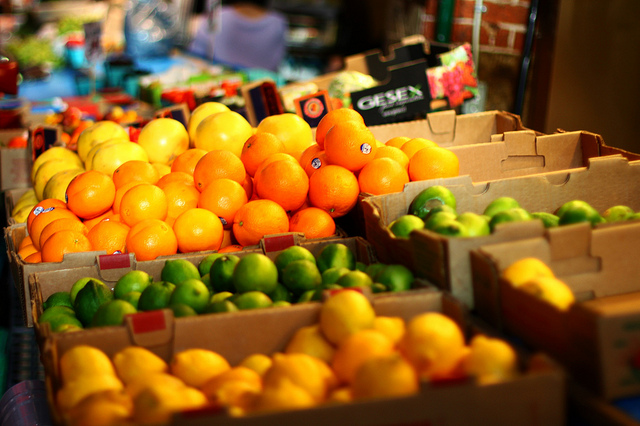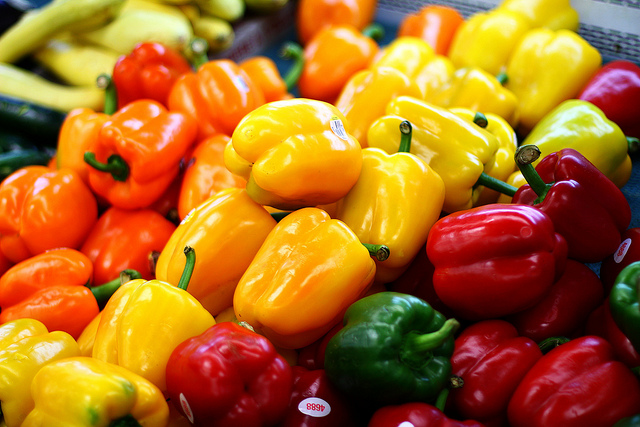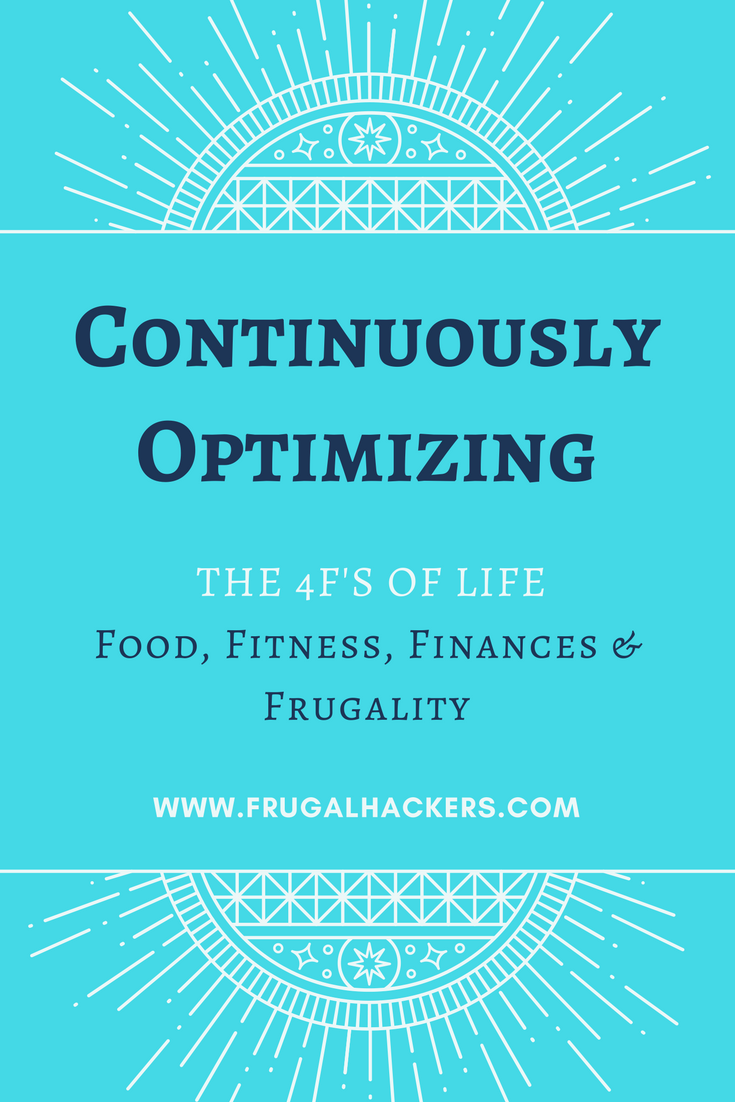True happiness begins with what we eat, so here at Frugal Hackers HQ, we give our food, nutrition, and diet quite a bit of thought. We choose what we eat consciously every day, instead of just what's convenient or quick. It should come as no surprise then to our readers that we put food as our #1 priority, even before the other 3 F's of life: fitness, finances, and frugality. Food plays a big part in influencing our health, mood and happiness, and money without good health is moot.
Since food, diet, and nutrition is such a critical component of our lives every single day, we adhere to the following guidelines strictly to ensure we lead a happy, fulfilled, and long life. When it comes to food, we focus on the big picture. It's more important to get the big picture right than to optimize all the little details. In this post, we go through the 5 big picture ideas that matter the most.
1. We avoid Overeating at all costs
Overeating causes so many issues to your life, the least of which is wasted food. It requires you to exercise more to burn those extra calories, it creates lethargy, your body burns more energy trying to break down the excess food, you have larger sugar spikes requiring more insulin production, your body and organs work overtime trying to process and digest all the excess food, and on and on the list goes. If there is one thing you could do to solve so many problems in your life at once, it is to curb overeating at all costs.
What is the single biggest indicator of health issues in the modern world? It's obesity. And where does obesity come from most of the time? It comes from overeating. Stop overeating and you instantly solve 60-80% of all diet-related health issues.
What is the easiest way to reduce overeating? We think we've figured it out. The solution is to make it a point to eat only when we're hungry. Ideally we go hungry around 15 minutes before our next meal. We try to minimize snacking in between. When was the last time you felt real hunger down in your stomach (not just in your brain)? If it was days or weeks ago, then you're doing something wrong. The correct answer should always be today, or perhaps yesterday or last night. Besides, food tastes way better if you eat it when you're hungry.
The second way to curb overeating is to just eat slowly. The easiest way to eat slowly is to chew your food thoroughly until it turns liquid. Then, leave a gap of at least 10 seconds between swallowing and taking the next bite. Shoveling food into your mouth as quickly as you can usually leads to overeating since your brain isn't given enough time to sense that the stomach is full.
We highly recommend weighing your food before eating it using a simple digital kitchen scale. We currently eat around 12 oz. per meal per person.
During the meal itself, we ration out our portions ahead of time. We've recently started weighing our food on a scale before every meal. We use this digital kitchen scale we bought on Amazon to quickly give us a pulse on how much food we're consuming. Our personal guideline for entrées is to not exceed 12 oz. That's 0.75 lb or 350 grams for our fellow metric readers. The scale we use has a built-in tare function which easily allows us to subtract out the weight of the bowl or plate.
Mrs. FH and I have also switched to eating particularly "risky" meals in a bowl rather than on a plate. A risky meal is one where we are likely to overeat based on past data. Eating out of a bowl tends to automatically reduce your consumption level since the bowl gets full faster. The bigger the container you eat in, the more you tend to eat. It's the same reason why grocery stores' shopping carts have been seriously expanding over time: they found that people bought more stuff the bigger their cart was. This is Parkinson's Law acting against you. Switch to a bowl and watch the rate of overeating incidents go down.
Over the last few years, I've also completely banned myself from eating at all-you-can-eat buffets that aren't free. Buffets make it way too easy to overeat, and not allowing yourself to go to these restaurants eliminates the problem entirely. At work, where we have a free buffet everyday, I limit myself to just one serving per meal so as to not keep going back for seconds. I don't overeat at work since the buffet is free, it's not novelty (I'm guaranteed to have another buffet waiting for me the next day), and most importantly, I actually have to be productive at work after lunch.
In summary, solving the overeating problem is so advantageous to your life on so many different fronts that it's worth doing so at all costs. So take the time and effort to figure out all the root causes of why and how you tend to overeat, and curb them one by one like the plague.
2. We eat a 100% vegetarian diet
We don't eat any meat, and that has been great for both our bodies and our budget. Turns out meat isn't really a required commodity in one's diet. If we've survived 30 years with zero meat, almost anyone can. I don't take any supplements either, and both Mrs. FH and myself are quite healthy despite eating no meat or seafood whatsoever. In fact, we don't recall feeling any healthier at any time in our past. We do consume eggs and dairy (milk, butter, cheese, etc.) for the time being. In that sense, we're lacto-ovo vegetarian.
The best diets are comprised of at least 50% fruits, veggies, legumes, and nuts. Start with these 4 food groups as your base, and then layer on the other filler stuff like grains, proteins, fats, etc. on the top. It's kind of hard to overeat fruits, veggies, and legumes as they're not so delicious as the other food groups, so that solves the overeating problem at least partially. Even if you do, the ill-effects are significantly smaller compared to overeating carbs, fats, and proteins.
3. We've become less picky about what we eat
As of 2017, I've vowed to be able to eat absolutely anything vegetarian and in any order. I am no longer picky about what I eat and when. I consume food in any arbitrary combination or mix. Watermelons on top of hummus? Sign me up! Yogurt with boiled eggs on top? No problem-0! Croutons with scrambled eggs? Now that's what I call a food adventure! We wrote an entire post on our rationale for eating absolutely anything vegetarian. The tl;dr is that the larger the variety of stuff you eat, the easier it will be for your body to get all the required nutrients it needs, thereby making it harder for you to fall sick.
What's in this salad? All the things. It was delicious!
4. We Minimize eating out
Eating out is ridiculously expensive. Even something quick from a fast food place for $10 can add up very quickly. Let's say you eat out every single day for lunch at work. That's $2,500 in lunch money alone over the year. Compounded over 10 years at a 7% rate, that's easily $35k of your retirement nest egg vaporized into thin air. Eating out is extremely expensive in the long run, especially here in North America, since most of your money goes to labor, rent, and profit, rather than for the food itself.
But the more important reason to not eat out is that you don't have the faintest idea what you're actually eating. Restaurants, food trucks, and fast-food places add a ton of unnatural and artificial crap to make you food taste delicious and keep you wanting to come back. Sometimes, even eating frozen pizza from your local grocery store could be healthier than eating out.
If you're eating out just to treat yourself after an accomplishment well deserved, that's reasonable. But limit yourself to a max of once per week. And instead of overeating American restaurants' massive portions, carry the leftovers home to eat some other day (ideal), or throw them away instead. In the long run, it might be cheaper to throw away excess food than to stuff it into your body.
What's the best way to avoid eating out? Well, you couldn't have asked for a better segue..
5. We cook our meals at home from scratch
Cooking from scratch is the single biggest life hack that will solve so many of your problems in one shot. When you cook from scratch, you know exactly what goes into your meals, because you're making it. It also requires you to buy cheap groceries which is significantly better for your budget in the long run. Groceries in North America are dirt cheap relative to incomes. Most states don't even charge sales taxes on produce and other essential food items! There's also tons of food subsidies on raw groceries that you don't even see. When you buy food from outside, you lose out on the subsidies and have to pay sales tax on it.
Even if you have to pay for grocery delivery using a service like Instacart or Amazon Fresh, it is well worth it for the rewards of cooking at home.
Even if you have to pay for grocery delivery using a service like Instacart or Amazon Fresh, it is well worth it for the rewards of cooking at home. You can even treat yourself to buying groceries from fancy, expensive stores like Whole Foods, and it'll still turn out to be cheaper and better for your body than eating out.
Our trustworthy $85 Instant Pot 7-in-1 pressure cooker. This little guy speeds up our cooking significantly!
Set up a system that makes cooking at home dead easy. Stock up on groceries before you run out. Cook in bulk to get economies of scale. Speed up chores with well invested tools - Instant Pot, Vitamix, utensils, cutlery, etc. A well stocked and well managed kitchen goes a long way in reducing friction each time you have to cook, reducing your tendency to order in. Good tools can also reduce the amount of time you have to spend in the kitchen, allowing you to stop buying prepared and frozen foods.
summary
In closing, here are the 5 main nutrition-related hacks we employ everyday to optimize our food and diet. We believe these simple hacks alone can 10x your quality of life over the long run. The five simple hacks we follow everyday are:
- We avoid overeating at all costs
- We eat a strict vegetarian diet
- We've become less picky about what we eat
- We minimize eating out
- We cook all our meals at home from scratch
What are your favorite food hacks? What provides you with the biggest bang for the buck?
Related Posts












